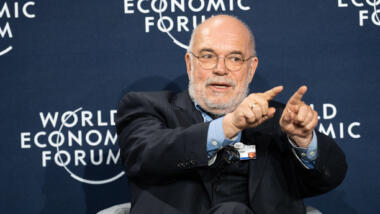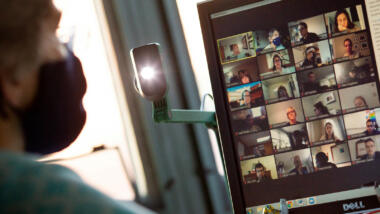Die Microsoft-Änderungen der „Wiener Erklärung“ zum WSIS halten sich weiter in den Medien. Eine de.internet.com-Meldung wertete die „Wiener Erklärung“ gleich zum UN-Dokument auf. Das ist nicht ganz richtig, da die Erklärung ein österreichischer Beitrag zum WSIS-Prozess war, wie beispielsweise unsere „Charta der Bürgerrechte für eine nachhaltige Wissensgesellschaft“, die wir vor zwei Jahren zum WSIS verfasst haben. Aber ein Beitrag zu einem Prozess der Vereinten Nationen ist nicht gleich ein UN-Dokument.
Trotzdem ist die de.internet.com-Meldung interessant, weil darin der Öffentlichkeitsmensch von Microsoft Österreich zu Wort kommt:
Microsoft beantragte die Änderung, da das Original eine einseitige Sichtweise auf die IT-Industrie bietet, so Thomas Lutz, Verantwortlicher für Öffentlichkeitsarbeit bei Microsoft Österreich. „Es ist nicht das Ziel der Anhänger freier Softwarte einen gesunden Wirtschaftszweig aufzubauen, sondern Einnahmen durch Software als kommerzielles Produkt unmöglich zu machen“, führte Lutz aus.
Ich denke mal, in diesem Fall kann man schon von bewusster Falschaussage, dummer Propaganda und gezielter Manipulation sprechen. Mir ist neu, dass das Ziel Freier Software sei, „Einnahmen durch Software als kommerzielles Produkt unmöglich (zu) machen“. Und als Unternehmer im Freie Software Umfeld verwehre ich mich gegen die Behauptung, dass es „nicht das Ziel der Anhänger freier Softwarte (sei,) einen gesunden Wirtschaftszweig aufzubauen“. Was für ein Schwachsinn. Was im IT-Markt im Moment fehlt, ist Chancengleichheit, woran das Microsoft-Monopol mit die Hauptschuld trägt.
de.internet.com bezieht sich auf einen Artikel aus ZDNet UK, den Georg Greve in seinem Blog aktuell kommentiert. In dem Artikel („Microsoft: Linux is anti-commercial“) findet sich noch eine andere Aussage von Thomas Lutz:
„The Vienna Conclusions document was created through a democratic feedback process as requested by the committee and stated on the committee blog. Each and every participant of the conference was invited to publish contributions, share feedback and offer changes which facilitated discussion and an open exchange of positions,“ he told ZDNet UK. „All of our change requests were approved by the committee.“
Und hier ist noch Georg Greve darauf:
Calling comments to a blog that apparently noone but Microsoft, IFPI and a few other selected individuals (including the committee) knew about „democratic feedback“ shows an interesting understanding of democracy.
Saying that all participants were invited to give feedback in this setting vaguely reminds me of Douglas Adams: Why do you complain? You could have protested against earths‘ destruction, the documents were publicly available on Alpha Centauri — if you got past the alligator pit in the dark cellar where the light is broken.
If Microsoft was so interested in dialog I wonder why they deliberately avoided talking to me at the conference, avoided participating in the panel the findings of which they had later modified, and (apparently) tried to prevent my speaking at the conference.
And yes. We already knew that the committee approved all the changes Microsoft wanted. That is precisely the problem.
Bei ArsTechnica findet sich auch ein aktueller Beitrag zu der Diskussion. Dort wird auch nochmal auf den Beitrag von Thomas Lutz im Konferenz-Blog zur Wiener Erklärung hingewiesen:
Lutz also attacks several other passages, and argues that software does not belong in the public domain. He insists that the sentence, „Software must be understood as the cultural technique of a Digital Society“ is inappropriate, because he feels that it „poses the notion of everybody should be a kind of software developer,“ and he argues that the phrase „technological freedom“ should be stricken because it represents the „political manifesto of the free software movement.“ Lutz also insisted upon the removal of references to Linux, because he feels that Linux is „anti-commercial.“
Ich bin der Meinung, dass Software in einer digitalen Gesellschaft als neue „Kulturtechnik“ eine bedeutende Rolle spielen muss. Nur leider wird das im Rahmen der Diskussion um Medienkmpetenz so noch nicht gesehen. Software spielt eine immer grössere Rolle in unserem Leben. Zur Medienkompetenz in einer digitalen Gesellschaft gehört auch, Software zu hinterfragen. Der Zugang zum Source-Code ist eine Voraussetzung dazu.




0 Ergänzungen
Dieser Artikel ist älter als ein Jahr, daher sind die Ergänzungen geschlossen.